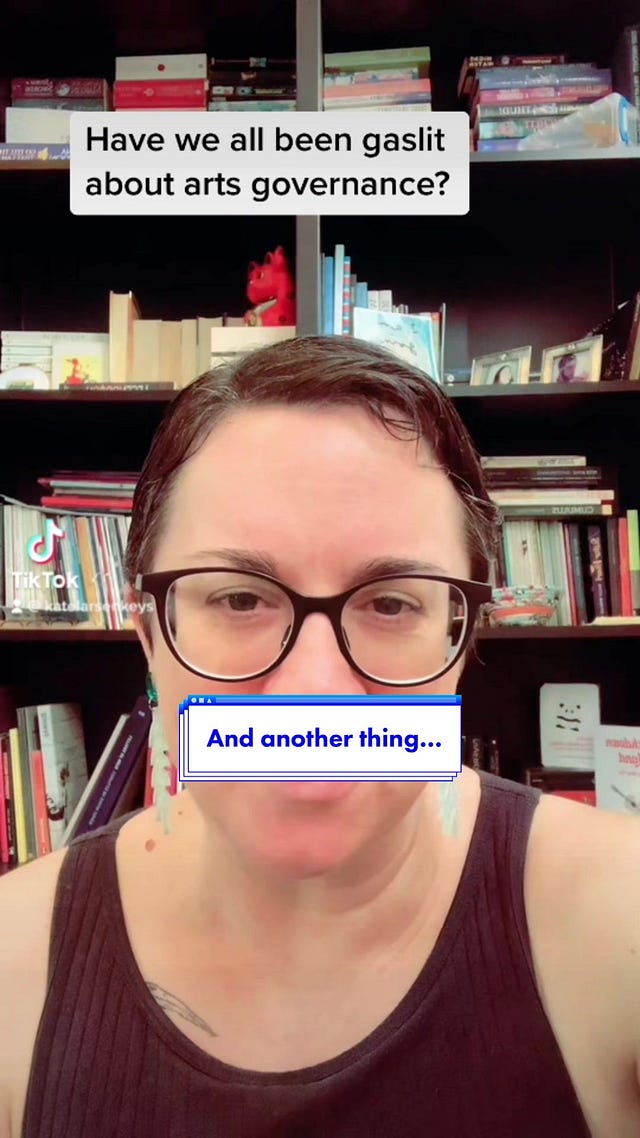Using a pseudonym | Arts governance gaslighting | Introducing Public.Open.Space
Plus one month until my AMaGA conference keynote
Welcome to my words, thoughts and ponderings for April. This enews includes my thoughts on using a pseudonym, a question about whether we’ve been gaslit about arts governance, and a sneak peak at what to expect in my debut poetry collection.
Should artists use a pseudonym?
As I shared with ArtsHub last month, I began using a pseudonym (Katie Keys) because of nepotism, not wanting London’s street press to realise the music reviews I was writing were often of my brother’s band. I kept it when I started posting a poem a day on social media (which I did for more than a decade), so my Twitter handle @TinyLittlePoems became a sort of secondary pseudonym too.
Using a pseudonym can help artists explore a new genre, build a different audience or give them the confidence they need to share their work. It wasn’t until I became Director of Writers Victoria that my creative practice and professional life came together. When someone unknowingly recommended I check out my own work, I realised my pseudo-name had become better known than my actual-name and set about merging the two back together (to @KateLarsenKeys).
To use, or not to use, a pseudonym clearly comes down to why, the article said, noting there are often practical reasons of safety when it comes to using a pseudonym in some countries.
While obviously wanting to avoid any association with the anonymous and unaccountable trolls that are perhaps the most common pseudonym users, alternative or pen names can also be useful tools in helping protect ourselves and our work.
I surveyed social media poets in Australia, China and Hong Kong while on an Asialink Arts residency at the Hong Kong Arts Centre. When asked how motivations and implications change where access to social media is monitored or controlled, poets in Hong Kong and China said they were more likely to write under a pseudonym and less likely to write about political topics for their personal safety, privacy and freedom.
‘I’m sure there is a degree of self-censorship in most poets and a fear of retribution if people write something less than favourable about political leaders,’ one respondent said. ‘I use a pen name as I speak about sensitive topics such as race, sexual assault and other personal matters that I would not be comfortable publishing as my own name,’ said another.
Read the full article on ArtsHub ($).
Have we all been gaslit about arts governance?
My latest ‘and another thing’ vlog for my Patreon followers highlights the confusion between what we think we need to do when it comes to arts governance and what the legislation actually requires. (Spoiler: it’s nowhere near the same.)

 Tiktok failed to load.
Tiktok failed to load.Enable 3rd party cookies or use another browser
Vision, tradition and control at AMaGA 2023
This time next month, I’ll be sharing my thoughts on the uncomfortable evolution of GLAM-sector governance at Discomfort: AMaGA National Conference 2023.
From statutory authorities to volunteer-run collectives, our work is underpinned by the extraordinary generosity of unpaid or low-paid boards, committees and councils. However, this precarious governance model sets boards and board members up to fail.
Now more than ever, our organisations don’t have capacity to support the perpetual cycle of governance training or address the damage that poor can boards leave in their wake. The world is changing, so our governance needs to change too.
But how do we address the big issues of governance from the depths of ‘post’-COVID exhaustion and find fit-for-purpose governance models that give us what we really need? From vision and oversight to fundraising and duty of care, this means reimagining something that serves us, not something that we have to serve.
Join us on Awabakal and Worimi Land in Newcastle or online.
Introducing Public.Open.Space
My debut poetry collection (Public. Open. Space, Fremantle Press, 2023) is just a few months away from being launched into the world. Here’s a sneak peak about what to expect…
Enjoy this enews?
If my work rethinking arts governance has been of value to you, I’d appreciate you joining me as an advocate, ally or accomplice from just $2.50/month on Patreon).
With huge thanks to Jaclyn and Jude for joining Team Patreon this month.
